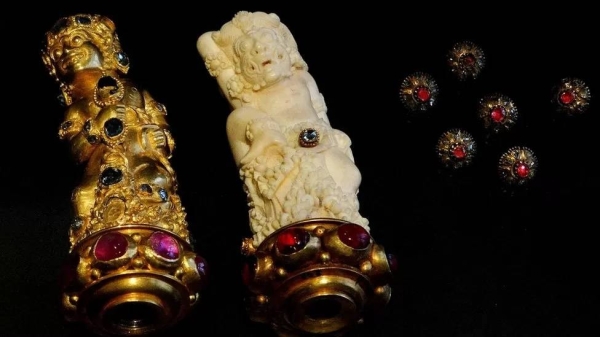
Amid rising global tensions and seemingly unending conflicts in Ukraine, Gaza and many parts of Africa, a bit of good news emerged last week. Germany and France have joined hands to launch a multiyear fund that will research the provenance of African heritage objects in the museums of both countries. The objective of the fund, currently pegged at €2.1 million ($2.28 million), is to prepare the ground for the return of objects if they were looted from former colonies.
To start with, the two countries will research objects from Togo and Cameroon. The move, even if experimental, is a very welcome one, as it comes amid ongoing heated debate on the fate of thousands of artifacts that are lying in dozens of European museums, both public and private, after being brought back from the former colonies of various European powers.
These former colonies have long been seeking the repatriation of objects they say were taken by force or simply stolen by the European powers — an argument that cannot be easily dismissed. In 2017, in a promising declaration, French President Emmanuel Macron announced that he would do everything in his power to return African cultural heritage looted by colonial France. Macron made this statement at the start of his tenure as president to coincide with the launch of his policy to intensify French engagement with Africa, notably the Sahel region. As part of this policy, France handed back 26 objects taken from its former West African colony of Benin.
However, since then, and especially since Macron’s reelection two years ago, the efforts to return objects seem to have stalled. Meanwhile, Macron’s African outreach policy lies in tatters, as a number of countries in the continent have turned hostile and Franco-African ties are now at a historic low.
It is this backdrop that makes the news of the fund seem especially welcome. One hopes that not only will the researchers be able to return many objects to Togo and Cameroon, but also that the results will encourage Germany and France to go even further.
In fact, the issue of the restoration of objects of heritage should be taken up at a global level. During the colonial period, almost every European power pillaged the colonies for their wealth, both in material terms for statues, objets d’art, gold, silver and precious gems and in intellectual terms, taking manuscripts, traditional knowledge and rare books.
Large chunks of the collections in Western museums have their origins in the colonized world. One study found that German museums had more than 40,000 objects taken from Cameroon, a country that was colonized by Germany for just a few decades. If this is the volume of objects taken from just one country by its colonial ruler in fewer than 50 years, it is difficult to imagine how many objects might have been stolen from colonies that were ruled by the colonial powers for centuries. Be it South Asian nations like India or the countries in Latin America, it is possible that millions of objects stolen from these countries adorn the museums of Europe.
Former colonies have long been seeking the repatriation of objects they say were taken by force or simply stolen.
Ranvir S. Nayar
In today’s world, there is no plausible justification that Europe can cite to defend itself on the issue of colonial heritage objects lying in its private or public collections. These objects belong to the people and countries from which they were taken. The restoration of these objects is not only the right thing to do, especially as a sign of the colonial powers’ recognition of their past crimes, but it is also a crucial step in turning the page on that very painful period of human history, when humanity failed to display its best attributes.
Some may argue that the objects of the colonies have only survived because they were secured and properly stored in museums in the West and that, if they had been left in the colonies, they may have been destroyed, especially in the turmoil that followed the end of the colonial period in many countries. Another argument that is used to justify their presence in Western museums is that these objects are shared human heritage and that, in a globalized world, people can enjoy seeing and studying these objects anywhere, not just in the country of their origin.
Both of these arguments are fallacious and an insult to the colonized. Thousands of heritage objects were destroyed during the wars inflicted by the colonial powers on their subjects, or even in the attempts of the colonizers to steal these objects and take them back. The large number of treasures lying in the wrecks of colonial-era ships in seas around the world are an indication of the scale of the looting and destruction.
And while it is clear that poorer countries would struggle to access the same technological and human expertise for conservation as the colonial powers, the latter could try to make up for their past sins by both returning these priceless pieces of history and heritage to their rightful owners and also helping with their conservation. After all, the developing world can very easily make the case for reparations from the colonial powers for all the thefts and other crimes committed by them over the centuries.
There are precedents of the West restoring artifacts and paying reparations, such as with many of the items seized by Hitler’s Nazis before and during the Second World War. Postwar Germany went to great lengths to find the rightful owners of art and other artifacts. If it could be done in the wake of the Second World War, there is no reason it cannot be done on a much larger scale today.
• Ranvir S. Nayar is the managing editor of Media India Group and founder-director of EIFE.
Disclaimer: Views expressed by writers in this section are their own and do not necessarily reflect Arab News" point of view












